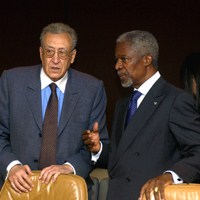There was a small but striking increase in the chances of a Western intervention in Syria last week. The Obama administration not only confirmed that it is “very likely” that the Syrian military has “used chemical weapons on a small scale in Syria” but also added that “the United States and international community have a number of potential responses available, and no option is off the table.” Secretary of State John Kerry privately briefed Congress on options ranging from diplomatic actions to a no-fly zone.
All this has been in line with previous U.S. warnings to the Syrian government against deploying its chemical weapons arsenal. But it does not mean that Western military action is imminent. Doubts remain over the intelligence on the alleged attacks. Even if the evidence proves to be totally accurate, many officials in Washington and other Western capitals will continue to campaign against a potentially highly risky military intervention.
Yet this episode has introduced a new element of uncertainty over the U.S. response to the Syria crisis, which could in turn create a fleeting opportunity for peace-making, or at least mitigating the war’s effects. Until now, Lakhdar Brahimi, the envoy to Syria for the United Nations and Arab League, has made little progress, and many have expected him to quit. Brahimi may now get a last chance to gain diplomatic leverage as the U.S. reviews its stance.

